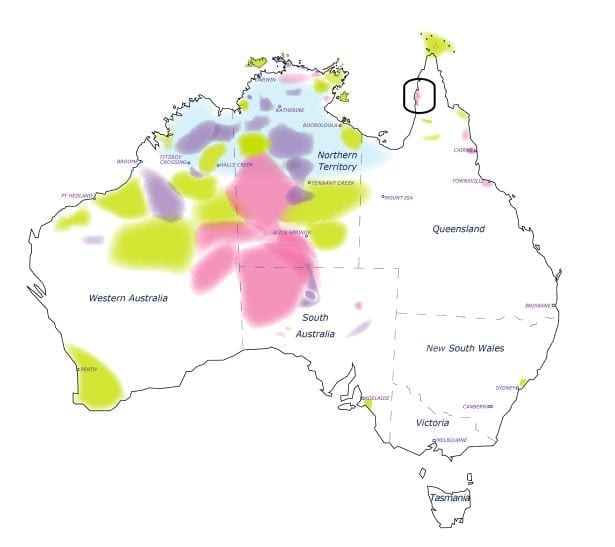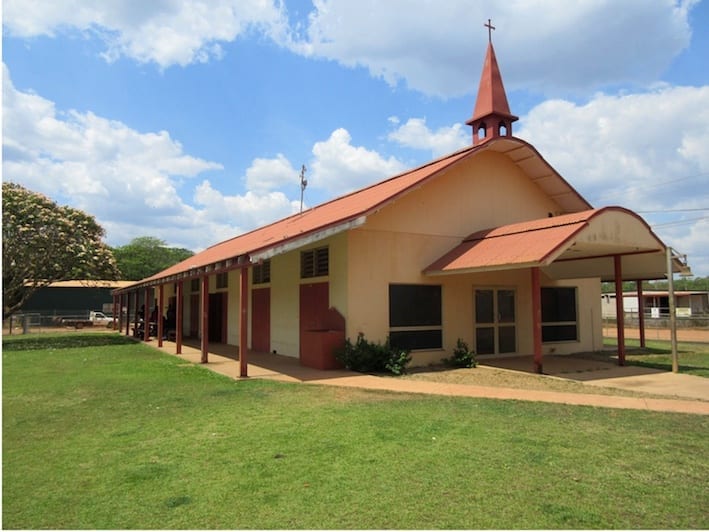Wik-Mungkan
‘Welcome’
Scripture Resources
Wik Inangan Kan-Kanam God.antama is a translation of the New Testament into the Wik Mungkan language.
This translation was prepared by several Wik Mungkan speakers and writers in partnership with members of the Wycliffe Bible Translators living at Aurukun. The work of the Wik-Mungkan co-translators was invaluable; clearly this New Testament would have been an impossibility without their input at many levels, for example, the writing of first drafts, stylistic editing, and careful and detailed final revision. The text has been checked by the Translation Department of the Summer Institute of Linguistics, Australian Aborigines Branch.
The translation principles on which this work is based are those contained in Translating the Word of God by Beekman and Callow.
Assistance with costs associated with the production and distribution of this New Testament has come from the Uniting Church of Australia, the Presbyterian Church in Cairns and many other friends. Their help and fellowship is gratefully acknowledged. (From preface of publication)
| Online Bible | Read the Bible online |
| android app | Go to Google Play Store |
| Download pdf version | |
| 5fish | Download audio from GRN |
These resources may be purchased through The Bible Place, 3/38 Elder St, Alice Springs, Tel 08 8953 3057. Email
| LANGUAGE | AUSIL CODE | CATEGORY | MEDIA | PUBLISHER | UNIT PRICE |
|---|---|---|---|---|---|
| English | ENGP507A -- Pacific Linguistics, Series B-No. 52Thematic Organization of Wik-Munkan Discourse | 500-Language & Culture | ANU | 10 | |
| English | ENGP5104A -- The Sentence in Wik-Munkan A Description of Propositional Relationships | 500-Language & Culture | Pacific Linguistics | 10 | |
| Wik-Mungkan | WIMC398A -- Selected Scriptures from NT Gospels | 300 Bible Stories & Small Portions | CD | CIMR | 10 |
| Wik-Mungkan | WIMD3138A -- Good News an overview of the Bible story | 300 Bible Stories & Small Portions | DVD | Ausil | 10 |
| Wik-Mungkan | WIMD3138A -- Good News_x000D_ an overview of the Bible story | 300 Bible Stories & Small Portions | DVD | Ausil | 10 |
| Wik-Mungkan | WIMD396A -- Nil jesus.an koyam man-yetham iiy-iiy _x000D_ Vol 3 | 300 Bible Stories & Small Portions | DVD | CIMR | 15 |
| Wik-Mungkan | WIMD396A -- Nil jesus.an koyam man-yetham iiy-iiy #3 | 300 Bible Stories & Small Portions | DVD | CIMR | 15 |
| Wik-Mungkan | WIMD525A -- Wik-Mungkan Interactive Dictionary | 500-Language & Culture | DVD | AuSIL | 15 |
| Wik-Mungkan | WIMD530A -- Wik-Mungkan Interactive Dictionary | 500-Language & Culture | DVD | AuSIL | 15 |
| Wik-Mungkan | WIMP525A -- Dictionary and Source Book of the Wik-Mungkan Language | 500-Language & Culture | SIL Darwin | 40.91 | |
| Wik-Mungkan | WIND399A -- Nil Puk many Jesus.an aak-ngeey | 300 Bible Stories & Small Portions | DVD | 15 | |
| Wik-Ngathana | WIGD3139A -- Words of Life | 300 Bible Stories & Small Portions | DVD | WBTA | 10 |
General Language Information:
Wik-Mungkan is a language spoken in and around Aurukun on the west coast of Cape York Peninsula in the north of Queensland. There are also some speakers of Wik-Mungkan or closely related dialects living at Weipa, Edward River, Kowanyama and Coen.
There are approximately 400 speakers of Wik-Mungkan and a further 600 people who use it as a second language.
Wik-Mungkan is used in bilingual education in schools, a programme first introduced in 1973, then revived in 1993.
The term ‘Wik-Mungkan’ can be used to refer to the language as well as the ‘tribe’ speaking it. Dialect names throughout this region are commonly prefixed by the term ‘Wik’ meaning ‘language’ and the following term denoting the particular dialect. In this case Wik-Mungkan means ‘those who say mungkan to mean eating.’
The English language has adopted at least one Wik-Mungkan term ‘taipan’ as a term for a venomous snake.
The Wik-Mungkan New Testament ‘Wik Inangan Kan-Kanam God.antama‘ was printed in 1985 and contains the entire New Testament.


John 14:6 Nil Jesus.an thawant, “In ngeey a! An puth ngayam keꞌ woyan niiyantaniya, niiy yipam kan-kanam God.an uwān nunang, aꞌ kan-kanam thiichān nunang niiy yipam ngangk aak umpuyangam wunān God.antan. Than weeꞌ-weeꞌanangana ngathar wampiythan-a, woyan ngatharaman wak-wakiythan-a, than ep woyan uwiythan, aꞌ piip God.ant wampiythan. Than weeꞌ-weeꞌanangana woyan thonan wak-wakiythan-a, than piip God.ant keꞌ wampiythan, yaꞌa.






